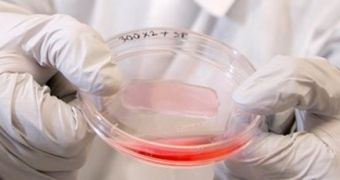Medical breakthroughs seem to be the main results of 3D printing technology, not counting the abundance of consumer-level 3D printers that have made their appearance over the past 3 years. TeVido BioDevices has just introduced the latest plan to improve the living of those suffering from certain conditions.
TeVido BioDevices is an early-stage life sciences/biotech company stationed in Austin, Texas, whose activities consist of using 3D bioprinting technology to print live cells.
Well, that's what it hopes to start doing in the near future. Right now, it is still raising the funds it needs to get its activities started, as it has only just completed development of its primary technology.
Essentially, TeVido BioDevices is using 3D printing techniques to create skin grafts that doctors may use to reconstruct certain areas of the body that may have suffered otherwise irreparable damage for whatever reason.
For now, though, the company is focused solely on women recovering from breast cancer. A nipple has been successfully printed and can be used in reconstructive surgery.
Correcting scars from a surgery is one potential application of the bioprinting process, but helping people recover from illnesses or injuries is doable as well.
The skin grafts are 3D printed from the patient's own stem cells, so there is no worry about rejection or other incompatibilities. They will integrate in the body naturally and won't need future maintenance. They could even be color-matched to the patient's skin, eventually.
They used the nipple as a starting point because it is small enough for the technology to work as intended. In the future, they hope to create larger grafts, but as we said, they need to secure more funding first. Also, this part is among the hardest things to rebuild during breast reconstruction surgery. Small fat grafts for women who have had lumpectomies will be the next step in the project.
It is estimated that the final products will reach the “market” in around five years, assuming the lab tests and clinical trials gain FDA approval in the meantime.
So far, the company has been given had $150,000 / €111,951 from the National Science Foundation, but more is needed. A fairly low sum, all told, but at least it allowed them to get off the ground.
TeVido BioDevices was founded back in 2011 and is led by CEO Laura Bosworth. It remains to be seen how and when the company's 3D printing techniques are shared with or adopted by other medical organizations. Helping recovery from breast cancer is a worthy goal, but the applications of 3D printed skin and fat grafts can be much more far-reaching if others get a shot at them.

 14 DAY TRIAL //
14 DAY TRIAL //